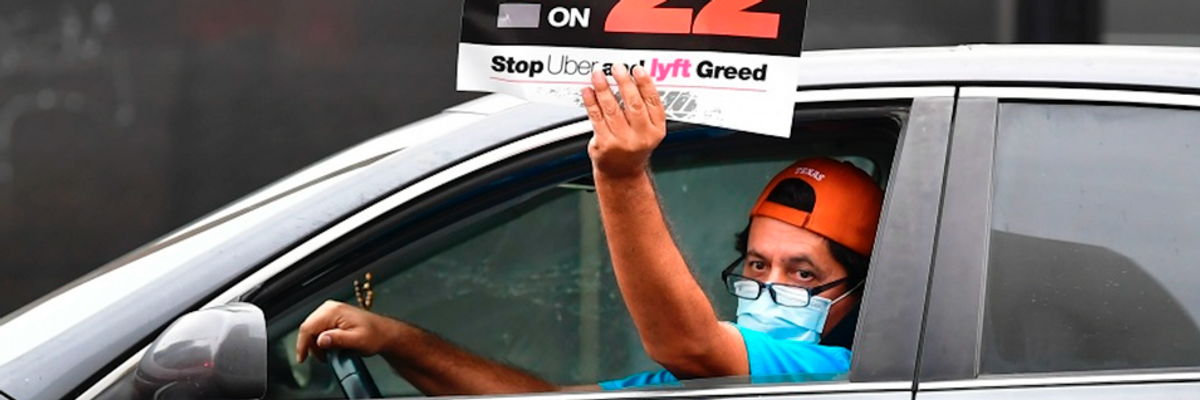Shares of Uber and Lyft soared Wednesday after California voters approved Proposition 22, which exempts app-based ride-hailing and delivery driving companies from classifying their workers as employees, allowing the firms to avoid providing basic--but costly--workplace rights and protections.
"Uber and Lyft invested around $200 mil. in a ballot measure to minimize labor costs and have gained around $8 billion in value in one day as a result. That's how democracy works, folks."
--Hamilton Nolan, In These Times
Uber stock was up more than 13% while Lyft shares surged 12% Wednesday following passage of Prop 22, which was by far the most expensive ballot measure in California history. Uber, Lyft, DoorDash, Instacart, and others outspent labor and progressive groups by more than 10 to 1, with proponents pouring a staggering $204.5 million into the "yes" campaign's coffers against just $19 million for the "no" side.
The record spending delivered the desired results for the "yes" side as over 58% of California voters approved Prop 22. Had the "no" camp prevailed, so-called gig companies would have been compelled to provide worker rights and earned benefits including the state minimum wage, healthcare, paid sick leave, overtime pay, and reimbursement of some of the work-related expenses that claim a significant share of drivers' income.
Prop 22 partially overturns Assembly Bill 5, a 2019 state law requiring app-based companies to reclassify their workers from independent contractors to employees. The companies, however, ignored and flouted AB 5, prompting a lawsuit from California Attorney General Xavier Becerra and the city attorneys of Los Angeles, San Diego, and San Francisco. In August, a San Francisco judge issued a ruling ordering the firms to comply with the law.
Uber and Lyft, who employ more than 400,000 drivers in California, argued that rejection of Prop 22 would have forced them to deactivate hundreds of thousands of drivers, curtail drivers' vaunted flexibility, and raise passenger fares, while opponents of the measure accused the companies of arrogant avarice.
"The passing of Prop 22 means that California app-based workers--notably the Black and Latinx workers who are overrepresented in these jobs--will not be able to claim the rights to fair pay, economic stability, and safety on the job that justly belong to them as employees," Rebecca Dixon, executive director of the National Employment Law Project, said in a statement on Wednesday.
"The corporations behind the 'Yes on Prop 22' campaign resorted to dirty and dangerous online harassment and pressured workers nonstop to vote for their racist business model," Dixon added. "Instead of providing basic protections to their workers, Uber, Lyft, DoorDash, and Instacart spent close to $200 million to mislead voters."
Morgan Harper, senior adviser at the American Economic Liberties Project, said in a statement that "Prop 22 is not just the most expensive ballot initiative of all time, it is also an egregious display of the ways dominant corporations use ill-won profits to entrench their power, shape public discourse, influence government policy, and avoid accountability."
"Since they were established, Uber, Lyft, DoorDash, and Postmates have done all they can to exploit the workers who make their services possible," added Harper. "From ignoring legislation like AB 5 and misclassifying their drivers as 'independent contractors' to brazenly plunging into market after market with zero regard for local taxi and limousine service regulations or emergency delivery fee caps, these dominant apps have shown time and again that breaking the law is a fundamental feature of their business model."
Labor and progressive organizers vowed to fight on despite Prop 22's passage.
"The end of this campaign is only the beginning in the fight to ensure gig workers are provided fair wages, sick pay, and care when they're hurt at work," Art Pulaski, executive secretary treasurer of the California Labor Federation, said in a statement.
In a blog post, Gig Workers Collective said:
We're disappointed in tonight's outcome, especially because this campaign's success is based on lies and fear-mongering. Companies shouldn't be able to buy elections. But we're still dedicated to our cause and ready to continue our fight. Gig work is real work, and gig workers deserve fair and transparent pay, along with proper labor protections. These companies are clearly afraid, otherwise they never would have needed to spend that $200 million--and it's workers they are afraid of.
"It's only a matter of time until the law catches up with them," warned GWC.

